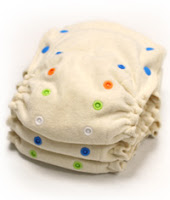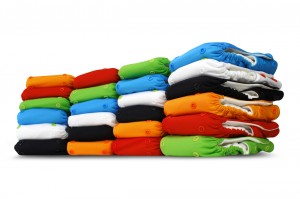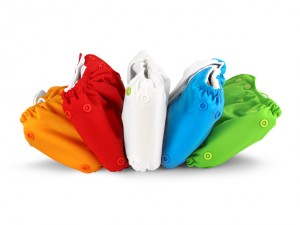
Whether you’re interested in cloth diapering full or part time, saving money or saving the planet, or simply believe there must be a better alternative to disposables, The Inquisitive Mom and BabyKicks Cloth Diapers want to help your family make the transition to cloth with The New to Cloth Diapers Series, beginning with 5 Reasons to Switch to Cloth Diapers.
We’ll be addressing 5 Reasons to Switch to Cloth Diapers in the first part of the series, then I’ve Decided to Cloth Diaper, Now What? in the second.
Achild will spend approximately 2 to 3 years in diapers during a time period when their skin is not fully developed and is highly absorptive. Newborns lack the acid mantle, an acidic film over the skin surface which acts as a stabilizer and barrier against bacteria, viruses, and other contaminants. Water, soaps, and some cleansers can also disrupt this acidic film in infants and young children making them more vulnerable. Contact
dermatitis can occur as an irritation due to overly sensitive skin or an allergic reaction to the chemicals, fragrances, or dyes found in disposable diapers. Oftenthe gel in disposables is the main reason for an allergic reaction.
Cloth diapers without plastic covers such as fitteds or pockets with gussets are breathable and can prevent a rise in temperature. Natural fibers created without the use of chemicals, such as hemp used in BabyKicks Diapers, also can prevent diaper rash. The essential oils found in hemp can inhibit bacterial growth and fungus. Hemp is highly absorptive and can hold an enormous amount of urine preventing excessive moisture from breaking down the skin.
3. Environmental Concerns
Disposable diapers produce at least 70 times more trash than cloth diapers. It’s been estimated that disposable diapers make up 4% of household waste and it’s uncertain how long it will take a disposable diaper to decompose. While all solid waste should be dumped before diapers are disposed of, most households simply put soiled diapers in the trash. The energy associated with manufacturing, packaging, and distributing cloth diapers is also a concern. It’s estimated that one baby will go through 8,000 disposable diapers before potty training. A child may use 60 to 100 (high estimate) cloth diapers in a lifetime. There are manufacturing and distribution costs (and some chemicals), but cloth diapers can be reused by subsequent children, donated to families in need, sold or traded, or re-purposed for cleaning and other projects. Also, when you choose hemp products, such as BabyKicks, you are choosing a product that does not deplete the soil and improves soil fertility.
4. Exposure to Chemicals in Disposable Diapers
Disposable diapers contain dioxin, super absorbent polymers (SAP), Polyethylene, and Tributy-lin (TBT). These are linked to reproductive and developmental problems, skin irritation, a release of natural gas vapors, and other environmental dangers.
5. The Superior Look, Feel, and Ease of Use of Modern Cloth Diapers
Cloth diapers come in an amazing array of colors and patterns, from the classic pastels, to bold patterns, to creative embellishments. Rather than using chemically laden paper and plastics, cloth diapers are made of soft hemp, fleece, cotton, and microfiber. They are more comfortable against baby’s skin and offer fabric options you’ll feel comfortable putting them against your baby’s sensitive skin. Plus, if you’re thinking pins and plastic pants, think again. BabyKick Diapers are quick to change, quick to dry, easy to use, and feature air vents, leak protection, and custom fabric blends.
Why Choose BabyKicks Cloth Diapers?
BabyKicks products are made of the highest quality natural and organic materials. Over 90% of their products are handmade in Maryland. They use hemp in their products because its durability, absorbency, and natural anti-microbial properties. This means your baby will be naturally protected from mold, mildew, and fungus. Hemp is also a better environmental alternative to cotton. The adorable range of BabyKicks hemp products, from prefolds, to pockets, to accessories, are gentle on baby and gentle on the environment. BabyKicks is family owned and operated out of Maryland and is now available in over 15 countries.
For additional facts about cloth diapers, please visit The Real Diaper Association.
Thanks to Michelle Hill for contributing to this article. Michelle is a family nurse practitioner who stays at home with her one year-old son. She says, “I am loving this special time and enjoying being able to play such an intimate role in his life. I worked in the hospital for four years with cardiac patients, then transferred to a small private family practice for six years. I have a bachelor’s degree in nursing from SUNY Brockport and a master’s degree from St. John Fisher College.”





